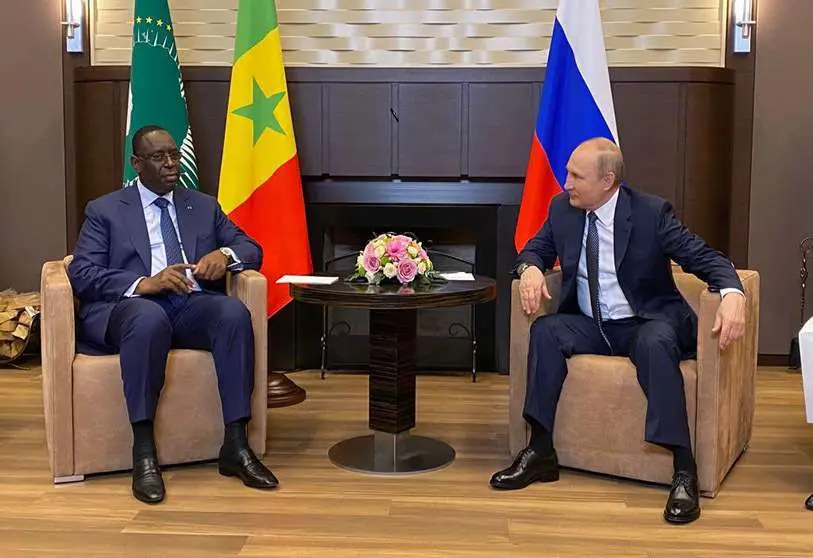Senegal's president meets Putin to tackle Africa's food crisis

The war in Ukraine triggered by Russian President Vladimir Putin's invasion has led to the highest food prices in Africa. The price hikes already exceed those recorded during the 2008 financial crisis and the 2011 Arab Springs, which have led to more than 80 million people becoming acutely food insecure, according to UN data. At least 30 million more than a year ago.
In a desperate bid to stem the crisis, Senegal's President and African Union (AU) leader Macky Sall travelled to Russia on Friday accompanied by Commission President and former Chadian Prime Minister Moussa Faki. They were met in the resort town of Sochi by Putin, who received them at his luxurious residence on the Black Sea to "unblock the grain and fertiliser stocks, the blockade of which particularly affects African countries", according to Sall's office.
The Kremlin, for its part, omitted the reason for the meeting and justified the meeting on the grounds that the leaders would discuss "issues of Russia's interaction with the African Union, including the expansion of political dialogue and economic and humanitarian cooperation". Although the charismatic Senegalese president's visit only sought to alleviate a crisis that has put millions of people in the grip of hunger and prompted, among other reactions, Chad to declare a state of national emergency over the issue.
Sall sought to open the Russian president's eyes to the global implications of his bloody campaign in Ukraine. "I have come to see you to ask you to be aware that our countries, even far from the theatre of war, are victims of this economic crisis," said the AU president, who also claimed to have defended the positions of other regions, such as Africa, which are in a critical situation.

"President Putin has expressed his willingness to facilitate the export of Ukrainian grain," Sall tweeted at the end of the meeting. He said Putin had pledged to allow the grain and fertiliser shipments, but did not elaborate on the content of the meeting, nor did he say whether Putin had put conditions on the table to give the green light to his request.
The Kremlin last week made public its willingness to facilitate food ships leaving Ukraine in exchange for the lifting of some sanctions imposed by Western allies, a condition perceived as "blackmail". Yet Putin maintains the contradiction while insisting that Russia is not responsible for the blockade of Ukrainian ports in the Black Sea.
Before the invasion, Ukraine was a major exporter of corn and wheat, and accounted for half of the world's trade in sunflower seeds and oil. But since then, the ports have remained unusable and have been mined by the Ukrainian resistance to prevent an amphibious assault by the Russian army. Kiev claims that Moscow's aggression has prevented the use of the ports, but the Russian president has assured that the country would be able to export grain if it first cleared the land.

Before meeting with Putin, the Senegalese president held a videoconference with the European leaders who were still meeting in Brussels to negotiate the sixth round of sanctions against Russia, to whom he conveyed that his country was avoiding taking sides. Sall then outlined the many problems facing the continent as a result of the war in Ukraine and demanded that the representatives of the 27 member states work to end the conflict.
"In the immediate future, we would like to see everything possible done to release available grain stocks and ensure transport and market access to avoid a catastrophic scenario of widespread shortages and high prices," he said. Forty-four percent of the wheat consumed on the continent comes from Russia and Ukraine, a figure that underlines how important the reopening of the ports is for Africa.
After the meeting, the President of the European Council, Charles Michel, blamed the EU and Russia for using food "as a weapon of war. Destroying crops, blocking tons of grain, risking world famine". "The European Union is sparing no effort to free Ukraine's exports by land and explore alternative sea routes," he said.

According to UN crisis coordinator Amin Awad, the supply crisis is expected to affect some 1.4 billion people worldwide. In this sense, some analysts warn that Russia's plans include provoking new massive migratory flows towards Europe as a result of the food crisis on the African continent and in other regions such as the Middle East.
Russian President Vladimir Putin has redoubled his economic, diplomatic and, above all, military efforts to consolidate his strategic interests in Africa. In 2019, the former KGB agent organised the first Russia-Africa Summit in Sochi with the aim of strengthening his support on the continent. As many as 43 heads of state or government attended, including the now leader of the African Union, Macky Sall, who had been in power for seven years at the time.
This perhaps explains why 17 of the 35 states that chose to abstain in the UN General Assembly vote condemning Russia's aggression over Ukraine were African. And the number could have been even higher had it not been for diplomatic pressure from Western powers. In the end, a majority of African states eventually voted to denounce Putin's invasion, but a large number have so far remained silent because of possible reprisals.
One of the countries that refrained from condemning Russia was Macky Sall's Senegal, paradoxically close to the West. The Senegalese leader had the opportunity to justify himself to German Chancellor Olaf Sholz during a recent visit to Dakar. "African states want to align themselves in this conflict, very clearly, we want peace. Although we condemn the invasion, we are working for de-escalation, we are working for a ceasefire, for dialogue... that is the African position," he stressed.








